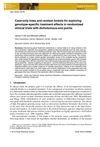15 citations,
April 2016 in “Medicine” SLE patients with Evans syndrome often show blood issues and need careful monitoring and treatment.
 13 citations,
April 2019 in “Actas Dermo-Sifiliográficas”
13 citations,
April 2019 in “Actas Dermo-Sifiliográficas” Vitamin D is important for skin health, but more research is needed to understand its full effects and treatment potential.
 8 citations,
February 2022 in “Molecules”
8 citations,
February 2022 in “Molecules” Asparagus racemosus root extract reduced sebum and pore size in men but not in women.
 7 citations,
February 2022 in “Stem cell reviews and reports”
7 citations,
February 2022 in “Stem cell reviews and reports” Skin cells show flexibility in healing wounds and forming tumors, with potential for treating hair disorders and chronic ulcers.
 3 citations,
March 2021 in “Clinical, Cosmetic and Investigational Dermatology”
3 citations,
March 2021 in “Clinical, Cosmetic and Investigational Dermatology” Early treatment of Lupus Erythematosus Alopecia can prevent permanent hair loss, and various medications are effective.
 2 citations,
January 2023 in “Journal of Clinical Medicine”
2 citations,
January 2023 in “Journal of Clinical Medicine” People with hair loss conditions may also have thyroid disorders, but more research is needed to understand the connection.
 1 citations,
July 2023 in “Journal of Clinical Medicine”
1 citations,
July 2023 in “Journal of Clinical Medicine” Different causes of beard hair loss have various treatments, including medications, lifestyle changes, and procedures to stimulate hair growth.
 1 citations,
January 2023 in “IDCases”
1 citations,
January 2023 in “IDCases” A patient experienced severe hair loss after getting an mRNA COVID-19 vaccine.
 1 citations,
May 2022 in “IntechOpen eBooks”
1 citations,
May 2022 in “IntechOpen eBooks” Obesity leads to physical, metabolic, reproductive issues, higher healthcare costs, and mental health problems.
December 2024 in “Journal of Clinical Medicine” PCOS and eating disorders are linked by hormonal imbalances, needing personalized treatment.
 November 2024 in “Fermentation”
November 2024 in “Fermentation” Fermented ginsenosides from kimchi bacteria may promote hair growth better than finasteride.

Thermal spring waters and their microbes could be good for skin health and treating some skin conditions in skincare products.
 March 2022 in “Wound practice & research”
March 2022 in “Wound practice & research” New treatments for alopecia areata show promise, but standardized guidelines are needed.
December 2020 in “The journal of investigative dermatology/Journal of investigative dermatology” Papulopustular rosacea is an inflammatory skin condition treatable with lifestyle changes and medications.
 26 citations,
March 2007 in “Clinical and experimental dermatology”
26 citations,
March 2007 in “Clinical and experimental dermatology” Pimecrolimus cream is not effective for treating alopecia areata.
 3 citations,
January 2021 in “Skin appendage disorders”
3 citations,
January 2021 in “Skin appendage disorders” Hair color is not a risk factor for developing alopecia areata.
9 citations,
May 2016 in “Clinics in dermatology” Phototherapy can help treat hair loss in alopecia areata.
 December 2019 in “Pubvet”
December 2019 in “Pubvet” The document concludes that atopic dermatitis in dogs is managed with various treatments including antipruritics, supplements, and possibly immunotherapy.
 July 2013 in “Our Dermatology Online”
July 2013 in “Our Dermatology Online” Oral methylprednisolone pulse therapy helped an 11-year-old regrow 80% of his hair in six months.
 January 2006 in “Advances in developmental biology”
January 2006 in “Advances in developmental biology” The Hairless gene is crucial for healthy skin and hair growth.
 June 2017 in “Journal of The European Academy of Dermatology and Venereology”
June 2017 in “Journal of The European Academy of Dermatology and Venereology” Alopecia patients have higher heart disease risk; statins and finasteride may help.
 2 citations,
January 2019 in “International journal of medicine in developing countries”
2 citations,
January 2019 in “International journal of medicine in developing countries” Many people in Majmaah city, Saudi Arabia, don't know much about vitamin D deficiency and don't practice good vitamin D habits, with few linking it to hair loss.
 7 citations,
March 2012 in “European Journal of Pediatrics”
7 citations,
March 2012 in “European Journal of Pediatrics” A boy with a rare skin condition and kidney disease improved with cyclosporine after steroids failed, suggesting a new treatment approach.
 5 citations,
July 2019 in “Applied statistics/Journal of the Royal Statistical Society. Series C, Applied statistics”
5 citations,
July 2019 in “Applied statistics/Journal of the Royal Statistical Society. Series C, Applied statistics” Case-only trees and random forests improve predictions of treatment effects in clinical trials.
 5 citations,
October 2018 in “American Journal of Clinical Dermatology”
5 citations,
October 2018 in “American Journal of Clinical Dermatology” Skin problems are common after stem cell transplants, and early treatment by dermatologists can improve patient outcomes.
 3 citations,
March 2015 in “Journal of the European Academy of Dermatology and Venereology”
3 citations,
March 2015 in “Journal of the European Academy of Dermatology and Venereology” Some people with primary cicatricial alopecia also have inflammatory bowel disease, suggesting a possible connection.
 2 citations,
September 2015 in “Clínica e Investigación en Arteriosclerosis”
2 citations,
September 2015 in “Clínica e Investigación en Arteriosclerosis” Some skin conditions may increase the risk of heart disease, but are not yet included in cardiovascular prevention guidelines.
 1 citations,
March 2015 in “Journal of the European Academy of Dermatology and Venereology”
1 citations,
March 2015 in “Journal of the European Academy of Dermatology and Venereology” A clinically suspected melanoma appeared benign under the microscope but was confirmed by specific tests and a rare mutation.
 February 2024 in “Scientific reports”
February 2024 in “Scientific reports” Four genes are potential markers for hair loss condition alopecia areata, linked to a specific type of cell death.
 November 2023 in “Journal of Cosmetic Dermatology”
November 2023 in “Journal of Cosmetic Dermatology” People with non-scarring hair loss often have lower vitamin D levels than those without hair loss.

























